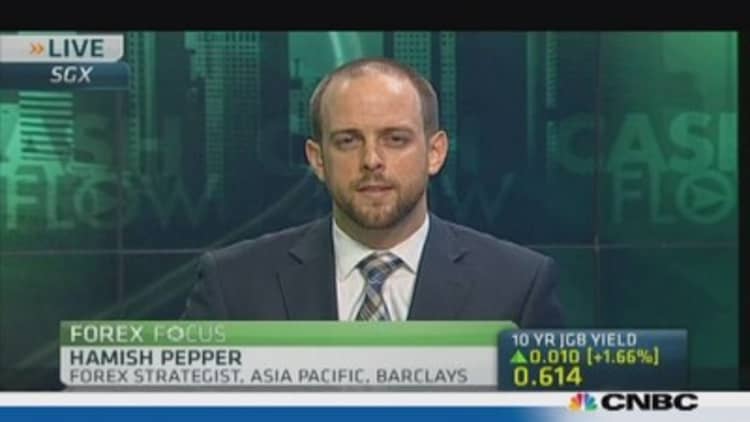The euro rallied on Thursday after European Central Bank President Mario Draghi said there is no euro zone deflation problem, following the bank's decision to leave interest rates unchanged and wait for more data before taking action.
Leaving the main monetary policy rate at 0.25 percent did not immediately spark the short-covering rally that saw the euro zone currency climb against the U.S. dollar, yen, and sterling.
"Really the move started when (Draghi) mentioned there is no deflation problem. That is when the euro gapped higher because when you are denying deflation you are not easing anytime soon," said Sebastian Galy, senior currency strategist at Societe Generale in New York.
The market was largely betting the other way on the ECB, expecting either a rate cut or a strong signal from Draghi that this was a prospect. It got neither and that set off the euro's short-covering rally to hit a one-week high of $1.36190, up 0.56 percent, against the U.S. dollar, according to EBS data. The euro hit a two-month low on Monday.
A bigger-than-expected fall of 20,000 new claims for U.S. unemployment benefits to a seasonally adjusted 331,000 did little to help underpin the U.S. dollar. The U.S. trade deficit widened to $38.7 billion in December as exports fell and imports rose.
While the U.S. data was mixed, the ECB's decision to wait for more economic data before acting on what kind of stimulus it might take raised questions about the euro zone's recovery despite its already ultra-low borrowing costs meant to push up prices.
(Read more: Deflation worries back as euro zone inflation falls again)

Euro zone inflation fell to just 0.7 percent last month and retail sales numbers on Wednesday were disappointing but recent business sentiment surveys have been more positive, offering the ECB some room to manoeuvre on policy.
"Draghi has taken time to explain why the ECB didn't take any action. One thing he highlighted was about new economic projections in March. He didn't commit to easing. I would be surprised if he did. But he is open to ease more if the next inflation print is similar to what we saw in January," Vassili Serebriakov, currency strategist at BNP Paribas in New York.
"On the crosses, it's all about relative rate differentials for the rest of the year. We are comfortable with short trades with the euro against other European currencies. European rates will remain low, while rates in the U.K., Norway and Sweden should rise," he added.
(Read more: Markets could drift as traders await jobs report)
The euro strengthened to a five-week high against the British pound, trading up to 0.83505 pence. It was last at 0.8325, up 0.4 percent on the day.
Against the Japanese currency, the climbed 1.1 percent at 138.76 yen. The rose 0.6 percent to 102.09 yen.
Currencies
Australia's dollar added to gains which have seen it jump more than 2 percent this week after the country's central bank dropped its bias towards lower interest rates and toned down a long-term call for the currency to weaken.
That put a halt to a months-long slide in the Aussie due to worries over Australia's economic prospects in the face of lower commodities prices and a slowdown in China, and some traders reported a handful of banks going long on the Aussie against the euro ahead of the ECB decision.
(Read more: Is the worst overfor the Aussie dollar?)
Investors pushed the up a further 0.6 percent to US$0.896.
The greenback gave up its gains on the to trade down 0.1 percent at C$1.1068. It earlier reached a session high of C$1.1122, after Canada reported a much bigger-than-expected trade deficit in December of C$1.66 billion ($1.49 billion), its biggest gap since 2012.
—By Reuters

